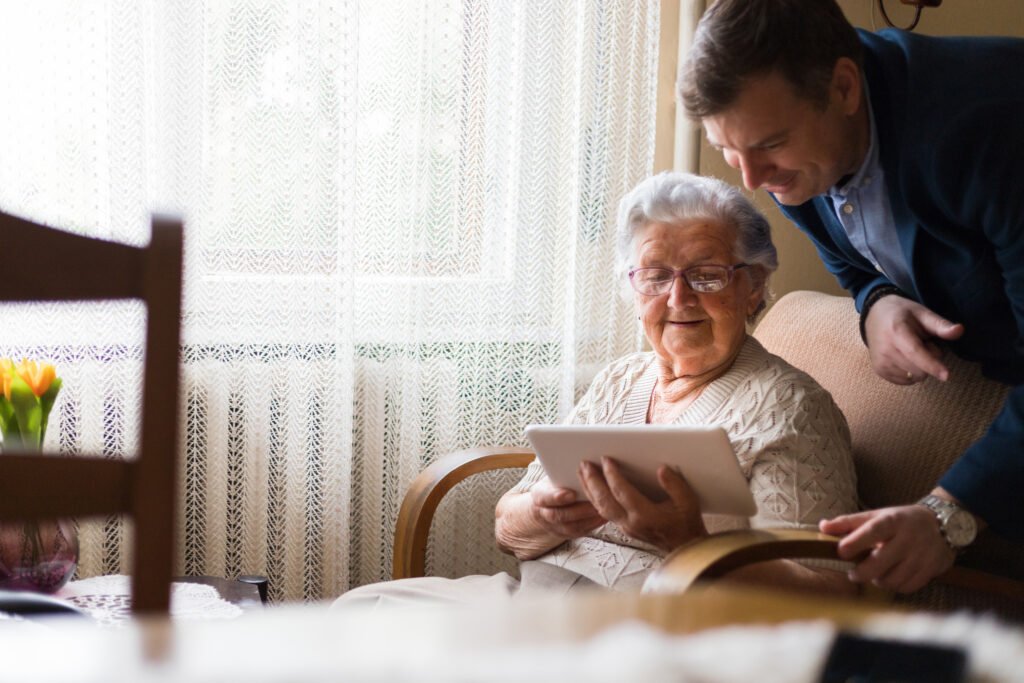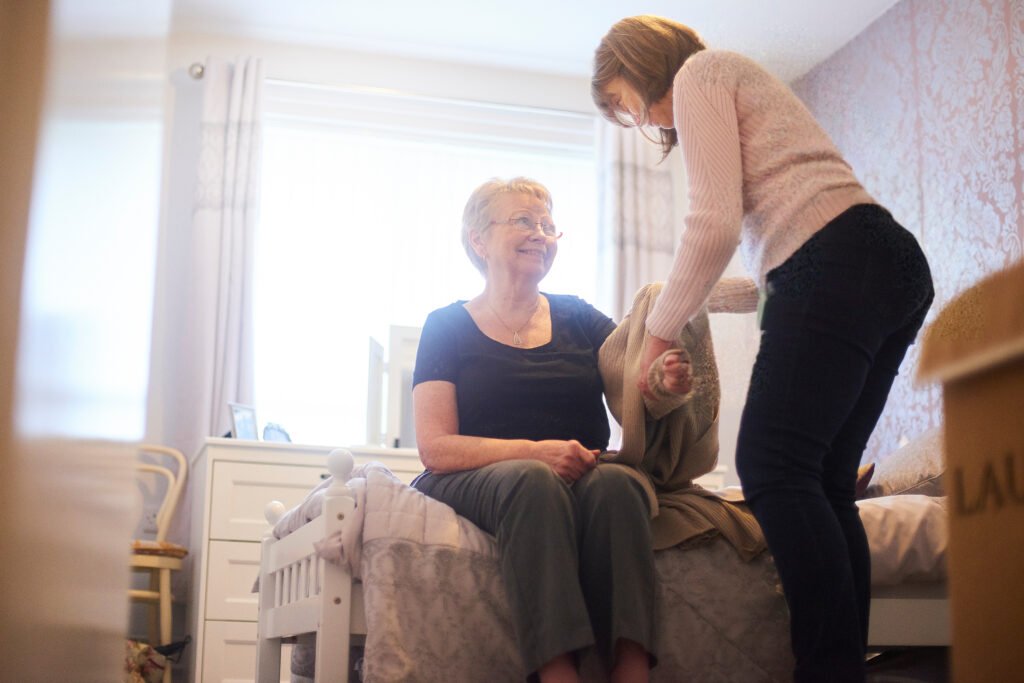
Legal Checklist for Arranging Elder Care (UK)
Introduction When an elderly loved one needs extra help, families often face a critical choice: should we opt for live-in

They evaluate the older person’s needs, both through conversation and reviewing any medical or social information. This covers health, daily living abilities, home safety, and even emotional and social needs.
Based on the assessment, they educate the family about what care options make sense. This could involve explaining the difference between home care and assisted living, or what respite care and day centers are available. They lay out the pros, cons, and approximate costs of each option.
The advisor helps craft a practical care plan tailored to the individual. This plan might include in-home care services, suggestions for home modifications, a schedule for family involvement, medical follow-ups needed, etc. It’s essentially a roadmap of how to meet the identified needs.
Care advisors often can recommend specific services or providers that fit the plan – for example, reputable home care agencies (naturally, at Prime Eldercare, our care advisor can coordinate our own care services), local adult day centres, meal delivery programs, or support groups for the elder or for family carers.
They can coordinate between different parties – talking to doctors, arranging for an occupational therapist to visit the home, ensuring the chosen care provider has all the info they need, etc. They’re like the project manager for the elder’s care.
A care advisor’s job isn’t necessarily one-and-done. They often remain a point of contact for the family, checking in to see if the care plan is working, helping adjust it as the elder’s condition changes, and troubleshooting any issues that come up (like a need for more care hours or questions about a new diagnosis or hospital discharge).
In short, a care advisor is the family’s ally and expert resource in making informed care decisions.
At Prime Eldercare, we provide a dedicated care advisor to work with potential and current clients. Here’s how our care advisor guides families

When you first reach out to Prime Eldercare, our care advisor will arrange an initial meeting – often at your loved one’s home, but it can be over the phone or at our office if preferred. During this friendly but thorough assessment, they will ask questions and listen carefully. For instance: What daily challenges is your mum facing? What times of day are hardest for her? What health conditions and medications does she have? What is her living situation and current support network? They may do a walk-through of the home to spot any safety concerns. This isn’t an interrogation; it’s a conversation aimed at understanding your situation fully. Many families find relief in just laying everything out to a compassionate professional who gets it.
After the assessment, our care advisor will summarize the key needs. They might say, for example, “It looks like Mrs. Jones is mostly independent in the morning but struggles in the evening due to sundowning from her dementia. She’s lonely since she stopped driving and is at risk of falls in the bathroom.” Then they’ll discuss with you and your parent (if they’re able to participate) what the priorities are – maybe safety in the evenings and more social interaction. This ensures that the plan focuses on what matters most.
Next, the care advisor outlines recommended services. In the above example, they might suggest: “We can have a Prime Eldercare caregiver come each evening for a few hours to help with dinner, medication, and getting ready for bed. That will ensure she’s safe during the sundowning period. We also recommend she attend the local memory café once a week for social interaction; I can help connect you with the organizers. Additionally, installing grab bars in the bathroom will help with safety – I can provide you info on a trusted handyman service that does this affordably.” They will also discuss contingency plans or future considerations (like, “If her dementia progresses further, we might later consider adding overnight care, but we can cross that bridge when we come to it”).
Our care advisor helps with the nitty-gritty. Worried about how to pay for care? They’ll walk you through possible funding options: “Let’s see if she’s eligible for Attendance Allowance – I’ll provide the forms and can help fill them out. Also, since she lives alone and has dementia, you could apply for a council tax reduction (severe mental impairment discount) – I can guide you on that process.” If legal documents like an LPA aren’t in
place, they’ll gently advise getting those sorted and can refer you to resources for that as well. Essentially, they try to foresee what paperwork or arrangements will smooth the path and prompt you on those.
If you decide to proceed with Prime Eldercare’s services (or any service the advisor recommends), the care advisor facilitates it. They will coordinate scheduling of the caregiver visits to suit your family’s routine, ensure the caregiver assigned is well-briefed about your loved one’s condition and preferences, and set up a communication channel with you. They basically hand-hold through the onboarding process, so nothing falls through the cracks and your loved one gets off to a great start with their new support.
Once care is in place, our care advisor doesn’t disappear. They will check in with you after the first week or two to ask, “How is it going? Is there anything you’d like to adjust?” If any issues arise (say you feel the visits need to be longer, or you want to add a weekend visit), you can call them and they’ll handle the adjustments. Down the line, if your parent’s situation changes (a hospital stay, or increased frailty), the care advisor re-enters planning mode – reassesses and updates the care plan, maybe suggesting additional services or equipment.
For families dealing with complex scenarios (multiple health conditions or family disagreements about care), our care advisor often acts as a mediator and coordinator. For example, if multiple siblings are involved, the advisor can host a family meeting (in-person or virtual) to present findings and recommendations neutrally, which helps get everyone on the same page. Or if there’s a need for specialist input, the advisor might work with a district nurse, physiotherapist, or dementia specialist to incorporate their advice into the care plan.
Our care advisor’s overarching goal is to ensure that your loved one gets the right care at the
right time, and that you as a family feel informed and supported throughout.
Why do families find a care advisor so helpful?
A few key benefits

Instead of you spending hours researching “best home care for dementia” or learning by trial-and-error, the care advisor brings that knowledge to you. They streamline the process of finding support. As one family put it, “Our care advisor was a one-stop solution – we didn’t even know what questions to ask, but she guided us through
everything.”
Families can sometimes overlook needs (either due to not noticing gradual declines, or not knowing what to look for). A care advisor’s expert eye catches things – maybe noticing early mobility issues or mild cognitive impairment that family didn’t see day-to-day. Identifying needs early means solutions can be put in place proactively, avoiding crises.
There’s no generic solution in elder care. The care advisor ensures the plan is tailored, rather than you possibly using a mismatched service. For example, some might jump to placing Dad in a care home because they think there’s no alternative, but an advisor might show that with a live-in carer and some tech aids, he can stay at home safely. The plan fits your loved one’s unique situation and preferences.
A care advisor advocates for the elder and family. They know the system and will speak up or navigate on your behalf. If dealing with hospital discharge planners or social services, having a care advisor’s input can ensure your family member gets the services they qualify for. They can help you ask the right questions and push for what is needed.
Elder care decisions are emotional. It’s common to feel guilt or doubt (“Am I doing the right thing for Mum?”). A care advisor provides a reassuring presence. They base recommendations on experience and best practices, which can give you confidence in your decisions. It’s easier to move forward when a knowledgeable professional confirms, “This plan is appropriate and we’ve seen it work well for others in similar situations.”
Over time, an involved care advisor helps maintain continuity. They remember the history (so you don’t have to re-explain everything to new people as often) and they keep an eye on the long-term picture, not just immediate issues. This continuity can lead to better outcomes because the care plan evolves smoothly as conditions change, without major disruptions.
Many families aren’t sure at what point to seek out this kind of guidance. Here are some indicators

If you’re just beginning to notice that your aging parent might need extra help and you don’t know where to begin, that’s an ideal time. Early planning can prevent emergencies and rushed decisions.
If your loved one has had a sudden change – a fall, a stroke, a hospital stay – and now needs care, an advisor can quickly map out immediate needs and longer term arrangements.
Perhaps you’ve been managing on your own but now there are too many moving parts (multiple medical issues, or you’re feeling burnout). A care advisor can step in at any stage to reorganize and optimize the care plan.
If family members disagree on care (e.g., one sibling thinks Dad is fine alone, another is very worried), an advisor provides an objective assessment that can help resolve conflicts. Their professional recommendation can carry weight in family discussions.
Whenever you’re facing something like applying for NHS Continuing Healthcare, sorting out care home placements, or needing to find a specialist facility (like a dementia daycare), an advisor’s knowledge is very useful.
For Prime Eldercare clients, our care advisor is part of the journey from day one. But even if someone hasn’t engaged our home care services yet, we offer care planning consultations as a standalone service to help families figure out their path.
Conclusion
Elder care is complex, but a care advisor lights the way through the complexity. They are planner, educator, coordinator, and advocate rolled into one – making sure your loved one gets the right support and that you, as a family, feel confident and supported in the decisions you make.
At Prime Eldercare, our care advisor becomes a trusted partner to your family, guiding you from the initial assessment to the ongoing adaptation of the care plan. With their help, you won’t feel like you’re guessing or going it alone; you’ll have expertise on your side. The result is a well-crafted care solution that meets your loved one’s needs and gives you peace of mind.
In essence, a care advisor helps you “get it right” – the right care at the right time – and that can make all the difference in the quality of life for your aging parent and the well-being of your family.

Introduction When an elderly loved one needs extra help, families often face a critical choice: should we opt for live-in

Introduction Choosing between keeping your loved one at home with care support or moving them into a care home is

Introduction Figuring out how to pay for an elderly loved one’s care can be one of the most stressful parts